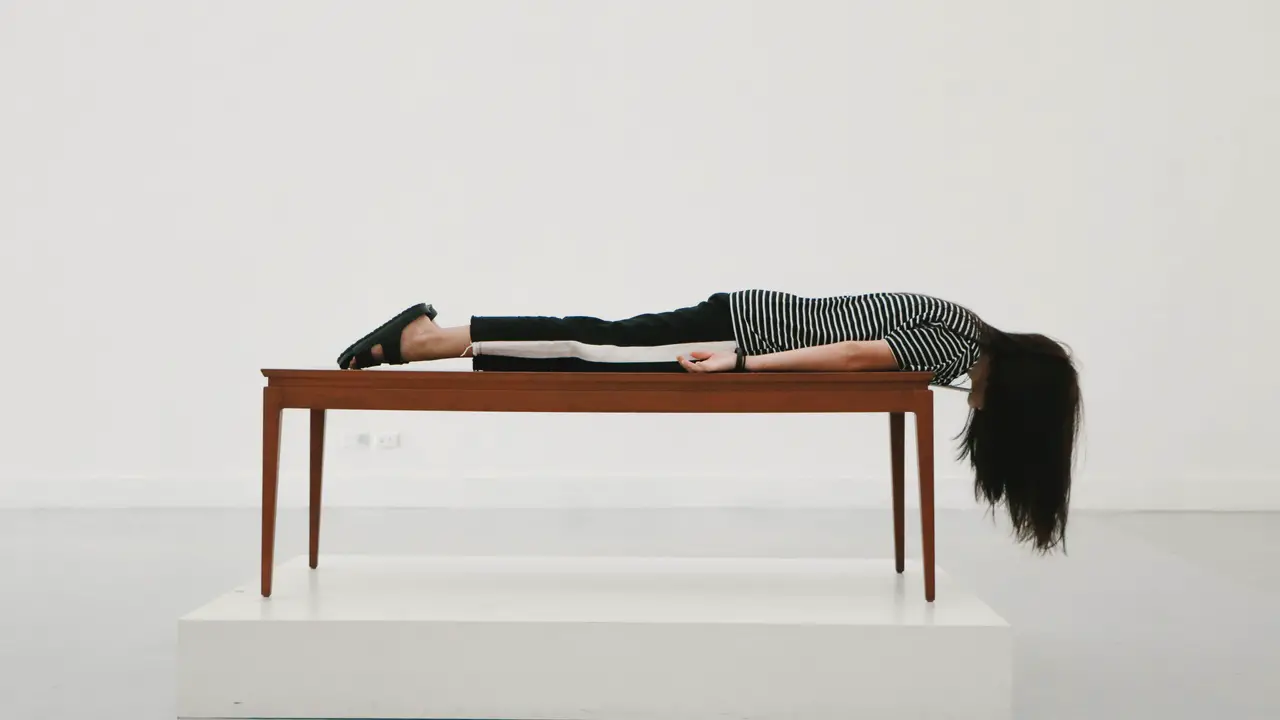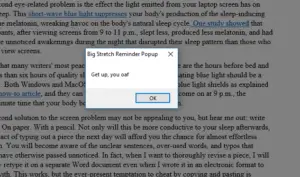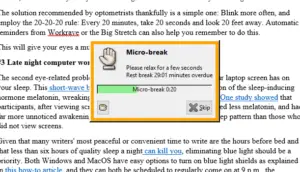Your writing career can literally kill you.
No, I'm not talking about starving to death or freezing in the winter, as some of your dubious relatives might have predicted will be your fate as a “poor” writer. Or your mother's warning that you'll expire from vitamin D deficiency if you never go outside. I'm referring to the act of sitting down to write, most likely at your computer.
An increasing number of studies show how detrimental desk jobs can be to our health.
You may not be chugging alcohol or smoking death sticks while writing like Ernest Hemingway, but sitting for hours on end could be your doom.
Let's look at the three common habits of writers that can cause harmful consequences.
1. Excessive Sitting
Writing is by nature a sedentary career (if you‘ve discovered how to jog while typing, please do let me know), and study after study has reported that sitting for long periods heightens your risk of cancer, heart disease, and death.
The longer you sit, the more likely you are to become obese or develop insulin resistance, leading to type 2 diabetes.
These studies, combined with the media's hype that "sitting is the new smoking," have prompted workplaces to remove office chairs and replace them with standing desks and even treadmill/stationary bike desks.
But you don’t need to go that far. Science suggests that the dangers of sitting can be effectively combatted by taking regular activity breaks every twenty minutes.
"Yeah, right," you're probably thinking. Though you may approve the idea of regular breaks in theory, the reality is that most of us (including myself) don't have the fortitude to follow through with this regime.
Ironically, the device that exacerbates the problem of excessive sitting can also be used to counter it.
The Big Stretch is a free software that remembers to take breaks for you. The frequency of its notifications, length of the breaks, and its messages are all completely customizable.
Another great free option is Workrave. Although the latter's design is less elegant, it features a setting which locks your computer for the duration of the break, making it mandatory. This program is also compatible with macOS.
Since most of us already take breaks from writing to scroll through our Facebook or Instagram feeds, replacing this mindless habit with a short burst of activity (such as folding laundry while standing) is a feasible option. It also gives your eyes a rest from staring at a screen for hours, which ties into the second harmful effect of long writing sessions.
2. Eye Strain
Everyone has heard that watching too much TV will damage your eyesight, and the same is often said about computer screens.
Although the theory that staring at screens causes long-term eye damage lacks solid evidence, hours of uninterrupted viewing are associated with symptoms such as headaches and red, burning, dried out, or itchy eyes, all of which fall under the catchall name Computer Vision Syndrome (CVS).
The culprit is usually the fact that gazing at a screen significantly reduces our average of 18 blinks per minute, which means your eyes aren't being bathed in their naturally occurring fluid.
Thankfully, the solution recommended by optometrists is simple. Blink more often, and employ the 20-20-20 rule: every 20 minutes, take 20 seconds and look 20 feet away. Automatic alerts from Workrave or the Big Stretch can help you remember to do this.
3. Late-Night Computer Work
The second eye-related problem is the effect the light emitted from your laptop screen has on your sleep. This short-wave blue light suppresses your body's production of the sleep-inducing hormone melatonin, wreaking havoc on the body's natural sleep cycle. One study revealed that participants who viewed screens from 9–11 p.m. slept less, produced less melatonin, and had far more unnoticed awakenings that disrupted their sleep pattern than those who did not view screens.
Less than six hours of quality sleep a night can kill you. Since many writers' most peaceful or convenient time to write is before bed, eliminating blue light should be a priority.
Both Windows and macOS have easy options to turn on blue-light shields as explained in this how-to article, and they can both be scheduled to activate at 9 p.m., the approximate time your body boots up its melatonin production.
The second solution to the screen issue may not appeal to you, but hear me out: write offline. On paper. With a pencil.
Not only will this be more conducive to sleep afterwards, but typing out a piece the next day will afford you the chance for almost effortless revision. You will become aware of the unclear sentences, overused words, and typos that would have otherwise passed unnoticed.
In fact, when I want to thoroughly refine a piece, I will retype it in a separate Word document even though I wrote it in an electronic format originally. This works, but the ever-present temptation to cheat by copying and pasting is thwarted when you have to replicate your handwritten words.
Small Changes Can Make the Difference
I apologize for stating the obvious, but you can't write if you're dead.
Whether it's from the heart attack caused by sitting all day or the sleep apnea aggravated by your laptop’s blue light, these are real risks that can be combatted by simple changes in your behavior. From one lazy writer to another, I promise it's possible.
Even if you have to trick yourself into getting up by deliberately leaving your laptop power cord upstairs or a thermos of hot tea waiting in the kitchen, every movement counts.
We already have to lament the untimely death of Jane Austen at age 41 and all the stories she might have gone on to write. Please do not inflict woe upon your future adoring fans with a preventable departure.
Our characters may be able to survive everything from stabbings to gunshot wounds, but we mortals can be debilitated by more mundane threats. And remember, if I could write most of this article while standing on tiptoes to reach the laptop perched on top of the fridge at my workplace, you can stand and stretch once an hour.
Treat your body well, and you will increase your chance of living long enough to develop your God-given talent and pursue a lengthy career in creative writing.
Get Your Free Guide
Sign up to get your free guide on building a writing habit!




Thank you for this article Sierra. I completely agree with everything you said.
Now as for jogging while writing. *waggles brows* I might or might not have discovered a way to do something like that just a few days ago.
I shall now go to not die.
Thank you! I’m afraid your quest to not die will ultimately be futile, but I wish you all the best with delaying the inevitable for as long as possible.
This is a fantastic article, Sierra! I’ve actually been thinking about this a lot lately…despite how I love being active, I always forget to stand up or move every now and then 😛
An alternative to the blue-light shield settings are blue-light shield glasses. You can get them on Amazon and they work wonders on your eyes. I rarely look at a screen anymore without them on, day or night.
They also have screen protector stickers. They’re transparent stickers that you stick on your screen that lower the blue light levels, make your screen easier and safer to clean, plus they also protect your fingers from the chemicals in touchscreens (there’s a smartphone version as well).
Chem– chemicals in touch screens? Is it just me or does it sometimes feel like the entirety of the industrial world is out to get you?
Beyond that, it’s great to hear the other options out there that you readers are utilizing!
I’ve heard of those, but have never tried them out myself. Do you know what the average price range is, Audrey (and do you consider them worth it compared to free device screen settings)?
I’ve personally never used the settings because I do graphic design sometimes and need to be able to see colors as they are 😛 With the glasses, I can just tip them down. They’re totally worth it! Mine were about $13. If you type in “computer reading glasses” on Amazon they should come up. The title is “Reduce Eyestrain, Anti Blue Rays, UV Protection Computer Reading Glasses.”
AAAANNNNNDDDDD… big stretch is downloaded.
Between my writing, my programming homework, and my internship, I am literally at a screen /all the time/.
This will help much. Thank you, Sierra!
Same! My eyes couldn’t handle the workload of 5-hour legal editing jobs and online college courses any longer, and this article was a product of the research I did. Glad to help my fellow team members out with it 😉
Thanks so much, Sierra! I love the software you mention and will be downloading them. 😉 I have noticed how much writing has affected me physically (if not mentally) and your tips made it clear that I should take better care of myself. Thanks again!
Glad to be of service, Bekah 🙂 Sometimes all we need is a little push in the direction we know we need to go.
And on a random note, I love your profile pic 😉
This is good reminder about these sorts of things, Sierra. I tend to forget about them after awhile.
Another effect of staring at screens all day (and this extends to books, or anything close to your eyes) is that the lens in your eye, which literally changes its shape to focus on near or far away objects, can get stuck in close-up mode and get sluggish at changing shape to see distant objects. This means your long distance vision will get blurry.
Also, jogging while writing… why not build a stand-up writing desk with a treadmill underneath it? 😀
Interesting point, Sam! I believe there are such things as stand-up treadmill desks, but I can’t see myself using one (or at least not very effectively… I hit the wrong keys often enough as it is 😀 ).
@sierra-r XD Sadly, me neither
Thanks so much Sierra. I definitely needed this article. :3
Thanks for this article, Sierra! I’ve already taken some preventative measures like standing or walking while reading (yes, I’m standing to type this comment 😜). Actually, some of these can be hazards for artists as well as writers (sometimes I have to stare at a screen for a while when I’m drawing from a photo).
The pen may be mightier than the sword, but it seems the chair is deadlier than the pen. 😉
Thank you, Mariposa! I got a good laugh from that last remark. Maybe I’ll put it up on my wall as a break reminder 😀
Since the very first draft of this article, it’s prompted me to keep the blue light filter on my phone in constant use. Now I think I’ll take advantage of my dad’s standing desk 🙂 Thank you for providing us with more valuable advice, Sierra.
You really ought to thank my mum for first making me aware of the blue light filter 😛 I haven’t had much success yet making myself stand while working (I lasted 15 minutes last time) but hopefully a dedicated desk will encourage you to do that.
GUYS! I JUST REALIZED IT. THIS IS WHY I MELT CHAIRS. @sierra-r
I’m dying. 😂😂😂 So, in other words, you are a dragon who saves lives? 😜
Oh yeah.
Kingdom Pen: Equipping young Dragon Snappers to save lives. 😉
@mariposa
I love it. I’m totally taking credit for uncovering Snapper’s secret completely by accident 😀 “Get off your chair or a dragon will melt it” is now going up on my wall beside Mariposa’s reminder.
XD I think I’ll put it on my wall too.
*cries laughing*
@dragon-snapper XD Wow. That makes total sense now. And also phones… have you ever done computers?
I’ll have to broaden my horizons.
Great article! I knew about blue lights before bed, but I didn’t realize that I could turn them off on my computer at a set time!
Thank you! Yes, it’s an incredibly helpful feature.
*Reads this while sitting at my desk working on my computer*
Yes… I suppose i should take your advice. Now downloading the Big Stretch and going to do some exercises… 😉
Good for you, taking instant action! I approve.
Oooh Sierra you just saved all us writers from dying young!! Thankfully I live a farming lifestyle so sitting for hours isn’t practical, (infact if I go for a walk I normally am inspired) but the blue light kills me…
@dragon-snapper 😂
Well, I don’t know about that, but hopefully I’m inspiring you to save yourselves 😀 Thanks for reading!
@sierra Thanks for writing this article. I’ve been to the chiropractor for excessive sitting issues, so I know that the struggle is real.
It is! You wouldn’t expect taking regular breaks from work to be so difficult, would you?